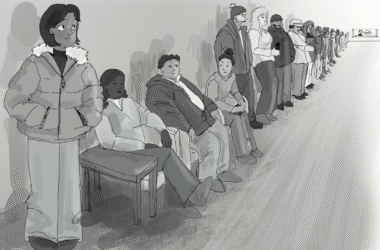A recent study published in Nature has revealed that a proportion of morbidly obese people are missing a certain piece of DNA. The study found that seven of every 1,000 obese people are missing a specific part of their DNA, which contains about 30 genes.
Professor Philippe Froguel and Dr. Robin Walters examined approximately 15,000 obese and non-obese people.
“We looked in nearly 12,000 non-obese people and only found [this piece of DNA] to be missing once, compared to 15 in 2,304 morbidly obese,” Walters said. “The chances of seeing that difference at random is vanishingly small – one chance in 1.6 billion – which means it is near certain that there is some causal relationship.”
Swiss researchers had found similar DNA patterns in obese and non-obese subjects, prompting Walters and his colleagues at Imperial College London to conduct the study.
“Each of us happened to notice from routine data that a small number of people were missing one of their two copies of this specific piece of DNA,” Walters said. “More careful investigation showed that all the adults missing this DNA were obese.”
Dr. Robert Sladek, an assistant professor of medicine at McGill and the Genome Quebec Innovation Centre, discussed his contributions to the study.
“We’ve got a long standing collaboration with Philippe Froguel at Imperial to look for diabetes genes,” he said. “So the work for the study was 95 per cent done at Imperial by Robin Walters … [Our] main role in this study was generating some of the first data that was used.”
“As the study was going I talked with Robin Walters,” Sladek said. “But my main role was that I was quite sceptical about the findings.”
Sladek said that this study would change the way diseases like obesity will be thought of in the scientific community.
“Up until now, we’ve been working with an idea that common diseases like obesity and diabetes would come from common genetics variances,” he said. “What this study is reporting is getting back to a genetics – rather than a genomics – approach.”
The study has demonstrated that this missing piece of DNA can have a drastic effect on a person’s health, making obesity almost inevitable.
“For some people, particularly people that carry this genetic variant, I would say being obese is almost unavoidable,” Sladek said. “And it’s questionable to me whether they could improve their appearance by either an exercise or diet regime.”
Having established that there is causality between this missing piece of DNA and obesity, the next step will be to study the way these genes interact and hopefully develop a treatment for obese people missing this piece of DNA.
“Now that we know that this deletion causes obesity, we can start looking at the genes affected by the deletion to find out which of them is related to the effect on obesity,” Walters said. “And if we can find out exactly why this deletion leads to obesity, we might be able to develop treatments to help the affected patients lose weight or avoid weight gain. At the very least, it will tell us more about why some people become obese and others do not.”
Although this has been an important step forward in this field of genetics research, Sladek pointed out that until further development has been made towards a treatment, people battling obesity should stick to diet and exercise.
“If you’re heavy right now, I’m going to tell you to diet and exercise,” Sladek said. “In the future, I’m going to tell you diet and exercise, and by the way, you have gene X broken and we know that a particular pill works better for people who are missing this particular gene.”
Sladek added that although this statistic of seven in 1,000 may seem slim, the implications can be felt throughout Canada.
“Let’s say seven in 1,000 morbidly obese people probably carry this variant based on our study; that’s going to translate into probably a few thousand people across Canada,” he said. “So it’s relatively uncommon, but for those few thousand individual people, it is likely having a very profound effect on weight.”








